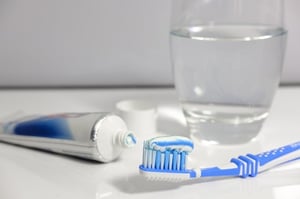As we get older, our bodies naturally start to change, and activities of daily living can become...
Age-Proof Your Mouth With These Healthy Teeth Tips
As the body ages, we find that many of the systems that have carried us through life begin to show their age. Our skin is not as soft, our hair may thin, and our teeth become weakened from their years of use. This is a normal occurrence as they show the wear and tear that occurs over the years. Still, it can be slowed through good oral hygiene, a healthy diet, and the assistance of dental care professionals.
How to Keep Your Aging Teeth Healthy
Regular Dental Care
While there are many ways to maintain the health of the teeth at home, it is still necessary to continue dental appointments throughout adulthood and retirement. Even when good oral hygiene is practiced throughout life, teeth still require additional care from your dentist and, in some cases, other professionals.
Complete teeth cleaning, including the emptying of any pockets that form between teeth and gums, helps keep bacteria and food particles away from the teeth below the gum line, decreasing the effect of the enamel. It also allows for early detection of all cavities and weakened areas so they can be repaired quickly. Filling cavities early can keep them from growing and can stave off the need for root canals and tooth extractions, allowing the natural teeth to remain intact later in life.
If teeth cannot be saved through a filling or a root canal procedure, they can be replaced with dentures, implants, or bridges. These processes allow for the gums to be kept healthy and for you to continue eating as usual with no alterations to a healthy diet.
Choose Healthy Foods
Some foods are detrimental to the health of your teeth, and others help them remain strong and protected. For the extended life of teeth, it is important to choose healthy foods and keep a balanced diet that provides all the needed nutrients.
Items that are high in sugar will weaken enamel and leave teeth vulnerable to cavities and damage. The longer that sugar is allowed to remain on the teeth, the more damage it can cause. So, while sugary foods are ok in moderation, it is important to brush regularly and rinse off any residue from sugary snacks. Fruit snacks and sticky foods such as caramel pose an increased threat to the healthy enamel of teeth. When these foods are enjoyed, teeth should be brushed soon after to remove the residue.
 Fruits and vegetables are essential for the vitamins and nutrients that are included within them. These will support the teeth, keep the gums healthy, and help teeth keep the enamel strong. Calcium and vitamin D are especially important to oral health and must be consumed daily. When it is not possible to eat enough of the correct nutrients, a supplement can be taken in the form of a daily vitamin or liquid supplement. Enamel cannot regrow, but it can be maintained in areas where it has not yet weakened. Lean meats that are high in protein will boost the health of the teeth and gums, allowing the natural teeth to remain as long as possible.
Fruits and vegetables are essential for the vitamins and nutrients that are included within them. These will support the teeth, keep the gums healthy, and help teeth keep the enamel strong. Calcium and vitamin D are especially important to oral health and must be consumed daily. When it is not possible to eat enough of the correct nutrients, a supplement can be taken in the form of a daily vitamin or liquid supplement. Enamel cannot regrow, but it can be maintained in areas where it has not yet weakened. Lean meats that are high in protein will boost the health of the teeth and gums, allowing the natural teeth to remain as long as possible.
When choosing foods to eat, it may be necessary to choose softer foods at some points. This includes everyday foods that are not nuts, overcooked, or jerky. Chicken, potatoes, soups, salads, and bread are all soft enough to not lead to chips in the enamel. Where a chip occurs, there is more likely to be a cavity than in teeth that are chip-free, and as the enamel weakens with age, the teeth become more prone to chipping.
Good Oral Hygiene Daily
 By ensuring teeth are brushed thoroughly and flossed at least twice each day, they can be kept clean and clear of residue. They should be brushed for two minutes each morning and night with attention to the gum line and any areas that have weakened enamel.
By ensuring teeth are brushed thoroughly and flossed at least twice each day, they can be kept clean and clear of residue. They should be brushed for two minutes each morning and night with attention to the gum line and any areas that have weakened enamel.
Flossing loosens any food particles that are caught between the teeth and between the teeth and the gums. Once dislodged, it is easier to brush away. Where a mouthwash is used, it can be replaced with one that has fluoride for an extra layer of protection for the enamel between dentist appointments.
Teeth should be rinsed after each meal to remove any loose particles and reduce the bacteria growth. It is also essential to drink enough water throughout the day. When the mouth becomes dry, it harbors bacteria and allows debris to gather near the gums and teeth. Keeping water intake high will also help keep the gums healthy and encourage the digestion of food, leading to proper nutrient absorption.
The teeth and gums naturally deteriorate as the years pass, and the wear and tear on them from use for all meals and snacks is certain to leave chips and cracks. The best ways to maintain healthy teeth while aging is to treat them well as early as possible and to maintain good oral hygiene and a healthy diet throughout life.
Maintaining the correct nutrients and vitamins is vital to keeping teeth healthy and protecting the enamel. However, there is still a time when it is necessary to see a dental professional for a deep clean and to create a fresh start. As pockets form between teeth and gums, small food particles can become trapped, increasing the formation of cavities and affecting the enamel. To strengthen enamel, brush, and floss regularly with yearly dental cleanings and address all cavities as early as possible. This will keep them from becoming larger and requiring root canals or extractions. Teeth must be flossed and brushed at least twice a day, and sugary and sticky foods should be avoided when possible to keep the teeth free of residue. Residue on teeth becomes tartar and can lead to cavities developing, which can worsen as time passes and become problematic if not treated.
Let us know in the comments below - how do you keep your teeth strong and healthy?







